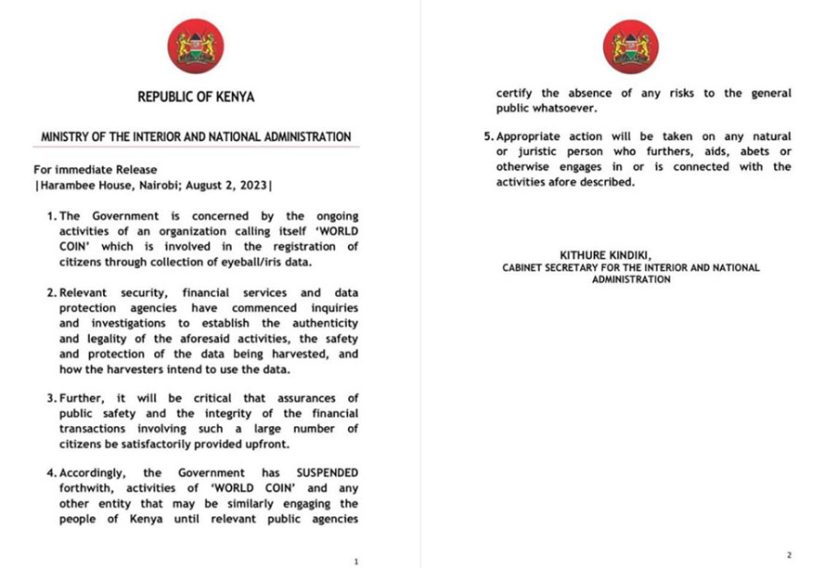Concerned Kenyan authorities have suspended creepy cryptocurrency Worldcoin, citing digital identity concerns.
The organisation, officially launched by project owner, OpenAI CEO, Sam Altman, late in July 2023, uses an individual’s biometric data to confirm identity.
An “Orb” retinal scanner (worth USD $5,000) maps a person’s eye recording their unique iris.
This, Forbes explained, gives users a “one-of-a-kind” global “digital identity to verify whether they are a real human or a bot.”
In an X thread commenting on Worldcoin’s launch, Altman said, “The goal is simple: a global financial and identity network based on proof of personhood; especially important in the AI era.”
(An era that Altman, as head of ChatGPT, is himself creating.)
Worldcoin also has its eyes set on being the foundation for a “universal basic income (UBI),” in what Coindesk described as an “ominous big brother” scheme.
The crypto economics version of The Financial Times has serious reservations.
Worldcoin’s eerie dystopianism outweighs its promised altruism, Coindesk noted in 2021.
“Users who want a Worldcoin account will have to have their eyes scanned.
“It is spectacularly, and inherently risky,” contributor, David Morris asserted.
“Frankly, there’s a strong argument that it should be illegal for a private company to gather this kind of biometric data about everyone on Earth, [at least] until we have better data regulations in place.”
Aside from the stupidity of calling the scanner an “Orb” with connotations of LOTR’s ‘Eye of Sauron, the whole thing is “creepy as hell,” he added.
Regardless of Altman’s promised privacy safety measures, Morris argued, Worldcoin is demanding people trust them with deeply intimate information, which, once compromised, can never be redeemed.
Yahoo observers, initially giddy at the prospect of checking out the tech, ended up terming the whole process of “Getting Orbed,” a “numb walk to a totalitarian end.”
Edward Snowden was just as pessimistic.
He essentially declared “cataloguing eyeballs” a bridge too far.
“Don’t use biometrics for anything. The human body is not a ticket-punch.”
The data is never truly deleted, he continued.
It’s still stored somewhere because Worldcoin “saves the *hashes* [unique encrypted data] produced by the scans to match *future* scans.”
Hence, Kenya’s skittish backflip.
They’ve suspended Worldcoin in an attempt to protect Kenyans and learn more about Altman’s ultimate agenda.
In an official statement, Kithure Kindiki, Secretary of the Interior and National Administration, said,
“Relevant security, financial services and data protection agencies have commenced inquiries and investigations,” into Worldcoin’s presence in Kenya.
Through this, Kindiki hopes, “to establish the authenticity and legality of their activities, the safety and protection of the data being harvested, and how the harvesters intend to use the data.”

MPs such as Kimani Ichung’wah, who appear to have helped push for Worldcoin’s suspension, are demanding answers.
Speaking to the Kenyan parliament, Ichung’wah sought clarification over conflicting statements, saying,
“[The suspension is] a little too late. This concerns many people. It was being done in government premises. Worldcoin must have paid somebody to use the facilities.”
The question is “Who let them do it?”
“In the age of artificial intelligence, it’s possible that Kenyans will be banned from walking through some places,” Ichung’wah warned.
“Let’s say you’re going to walk into a bank, and your iris has been used for committing crimes, without you knowing. Then you’re denied access.”
Or, “The next time you want to travel, you may find your passport, even image, and identity has been used wrongly?”
Slamming Worldcoin’s offer of FREE – “premined” – crypto “coins” in exchange for Kenyan’s giving over their biometric data, Ichung’wah said,
“In this day and age of terrorism, Kenyans need to be cautious. Not everything that glitters is gold!”
Easy money “may be very enticing, but may be very dangerous for you.”
He then asked, why, “Sam Altman, who is banned from collecting this data in his home country, the U.S., was he allowed to do so in Kenya?”
“What does the United States know about him that we don’t?”
Ichung’wah then expressed concerns that Worldcoin might be exploiting poor Kenyans, who may not know any better.
“Government has a responsibility to protect its people, and its people includes their personal data.”
Kenya’s Foreign Affairs secretary was just as direct.
CS Alfred Mutua, stated on X, “Being paid is important but you have to ask yourself why your eyes are being scanned and information gathered. What does it mean and what will it mean to you and your children?
“Let us all support the stoppage of Kenyans being used as Guinea Pigs and their data being harvested.”
Oddly, Altman has said he’s perplexed by the opposition, saying he “underestimated the visceral reaction to using biometrics for identity verification.”
This is somewhat understandable.
I can see the benefit of unique identifiers being a way to counter “deep fake fraud.“
However, as Coindesk quipped, where’s Altman been for the past 3-years?
New authoritarians have awakened a free citizenary to the dangers of being made subjects of the mass surveillance state.
Fauci’s pentathlon jabbers, and lockdown lovers may endorse the tech, for the rest of us, Worldcoin’s data collection, and retention devices are as sketchy as heck.
Magnifying those concerns, Altman’s offer to allow governments to get in bed with “getting orbed” presents a clear and present danger to what’s left of Western Civ.
Especially if the West’s bloated anti-Christian bureaucracies decide to weaponize biometric data.
In this context, Worldcoin would be empowering deep fake fraud, not preventing it.






















You must be logged in to post a comment.